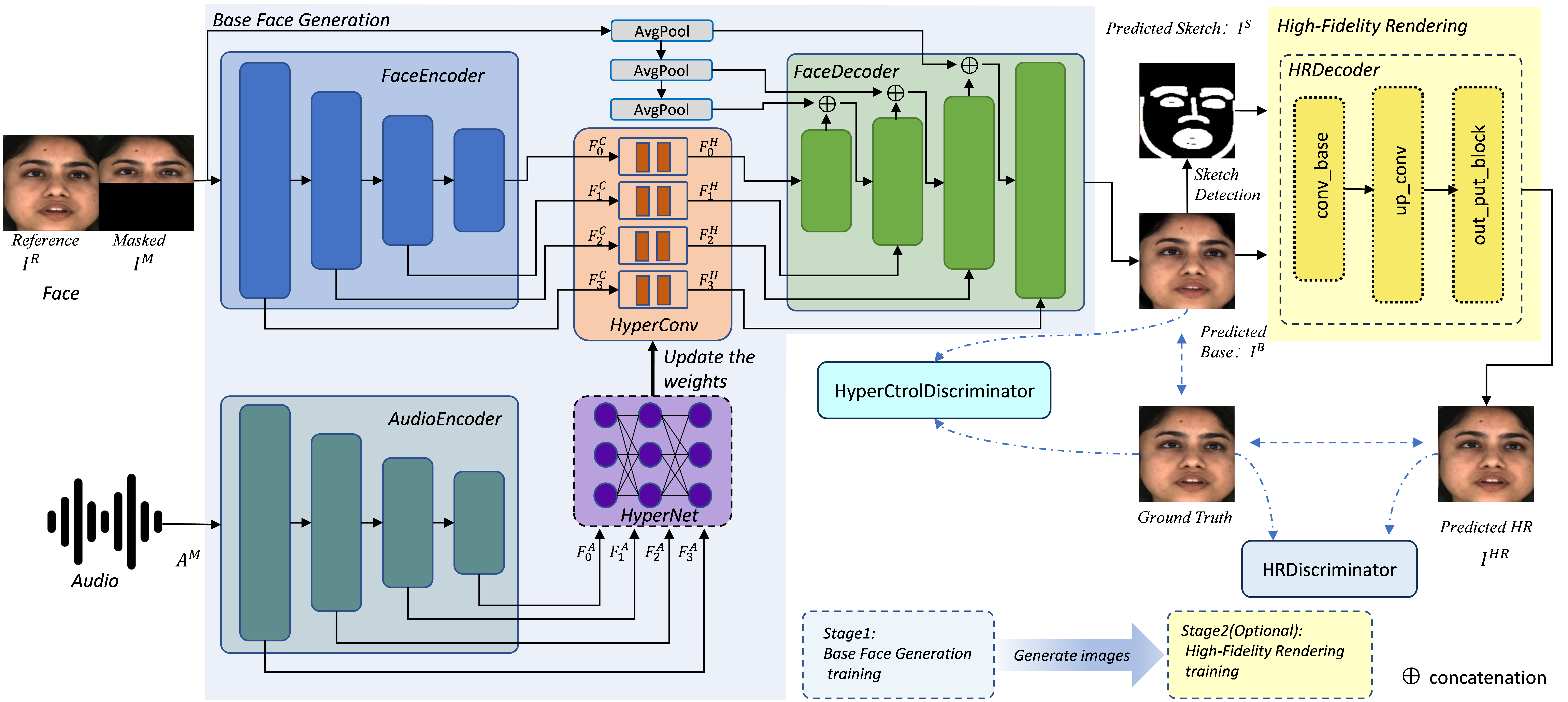Pytorch official implementation for our paper "HyperLips: Hyper Control Lips with High Resolution Decoder for Talking Face Generation".
- Python 3.8.16
- torch 1.10.1+cu113
- torchvision 0.11.2+cu113
- ffmpeg
We recommend to install pytorch firstly,and then install related toolkit by running
pip install -r requirements.txt -i https://mirrors.aliyun.com/pypi/simple
You also can use environment.yml to install relevant environment by running
conda env create -f environment.yml
Download the pre-trained models from BaiduYun,and place them to the folder checkpoints
We trained a pretrained model on LRS2 dataset.You can quickly try it by running:
python inference.py --checkpoint_path_BASE=checkpoints/hyperlipsbase_lrs2.pth
The result is saved (by default) in results/result_video.mp4. To inference on other videos, please specify the --face and --audio option and see more details in code.
Our models are trained on MEAD. Please go to the MEAD website to download the dataset. We select videos with neutral emotion and frontal view as MEAD-Neutral dataset and resample all split videos into 25fps by using software. All the videos after resampling are put in to datasets/MEAD/.
The folder structure of MEAD-Neutral dataset is as follow.
data_root (datasets)
├── name of dataset(MEAD)
| ├── videos ending with(.mp4)
extract the face images and raw audio from video files and generate filelists obtaining train.txt and val.txt by running:
python preprocess.py --origin_data_root=datasets/MEAD --clip_flag=0 --Function=base --hyperlips_train_dataset=Train_data
train the lipsync expert by running:
python color_syncnet_trainv3.py --data_root=Train_data/imgs --checkpoint_dir=checkpoints_lipsync_expert
You can use the pre-trained weights saved at checkpoints/pretrain_sync_expert.pth if you want to skip this step.
train the hyperlips base by running:
python Train_hyperlipsBase.py --data_root=Train_data/imgs --checkpoint_dir=checkpoints_hyperlips_base --syncnet_checkpoint_path=checkpoints/pretrain_sync_expert.pth
generate hyperlips base videos by running:
python Gen_hyperlipsbase_videos.py --checkpoint_path_BASE=checkpoints_hyperlips_base/xxxxxxxxx.pth --video=datasets --outfile=hyperlips_base_results
extract image, sketch and lip mask from origin videos and extract image and sketch from videos generated from hyperlips base videos by running:
python preprocess.py --origin_data_root=datasets/MEAD --Function=HR --hyperlips_train_dataset=Train_data --hyperlipsbase_video_root=hyperlips_base_results
train hyperlips HR by running:
python Train_hyperlipsHR.py -hyperlips_trian_dataset=Train_data/HR_Train_Dateset --checkpoint_dir=checkpoints_hyperlips_HR --batch_size=28 --img_size=128
You can also train HR_256 and HR_512 by changing --img_size.More details can be seen in code.
This project is built upon the publicly available code Wav2Lip and IP_LAP. Thank the authors of these works for making their excellent work and codes publicly available.
Please cite the following paper and star this project if you use this repository in your research. Thank you!
@InProceedings{
author = {Yaosen Chen, Yu Yao, Zhiqiang Li, Wei Wang, Yanru Zhang, Han Yang, Xuming Wen},
title = {HyperLips: Hyper Control Lips with High Resolution Decoder for Talking Face Generation},
year = {2023},
}
